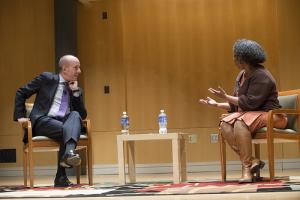Anthony Romero Visits Umd For Arts & Humanities Dean’S Lecture
April 23, 2014

Executive Director of the ACLU talks LGBT rights, surveillance and criminal justice reform.
By Samantha Suplee, Office of Communications
The third installment of the WORLDWISE Arts & Humanities Dean’s Lecture Series was held at Gildenhorn Recital Hall in the Clarice Smith Performing Arts Center last Wednesday, April 16, 2014. Dean Bonnie Thornton Dill gave opening remarks before Perla Guerrero, assistant professor in American Studies, introduced the guest speaker. Executive Director of the American Civil Liberties Union Anthony Romero thanked the audience for its warm reception, adding that the welcomes he receives elsewhere are not always as cordial, as ACLU remains fairly controversial for many Americans.
Before joining Associate Dean Sheri Parks in conversation, Romero touched on three topics central to his work: LGBT rights, government surveillance and criminal justice reform. He noted that, when he was the age of many audience members, homosexual men and women could be thrown into jail “simply for loving the person they loved.” He regards the ACLU’s win in United States vs. Windsor as a significant achievement in the campaign to legalize same-sex marriage nationwide. Edith Windsor and Thea Spyer had been lawfully married for two years before Spyer died in 2009 and left her entire estate to Windsor. Yet due to the Defense of Marriage Act (DOMA), which did not extend federal tax benefits to same-sex marriages, Windsor faced almost $400,000 in estate taxes. The ACLU took her case, and the Supreme Court ruled DOMA unconstitutional in 2013.
“People began to understand it was a matter of fairness,” Romero said. “It was a matter of treating people right."
Romero is an advocate for reform in the criminal justice system. He believes treating drug addiction as a public health issue, rather than a crime, could drastically reduce the prison population as a majority of the nation’s 2.5 million incarcerated people are nonviolent offenders. He also explored Edward Snowden’s release of NSA surveillance documents and general notions about privacy. Romero is most alarmed by a perceived apathy after the public’s basic personal freedoms have been compromised. Without constant vigilance from the American people, the liberties we take for granted today could disappear.
“The law is there to protect us when times get tough,” Romero said. “We don’t think we’ll ever need our rights.”

